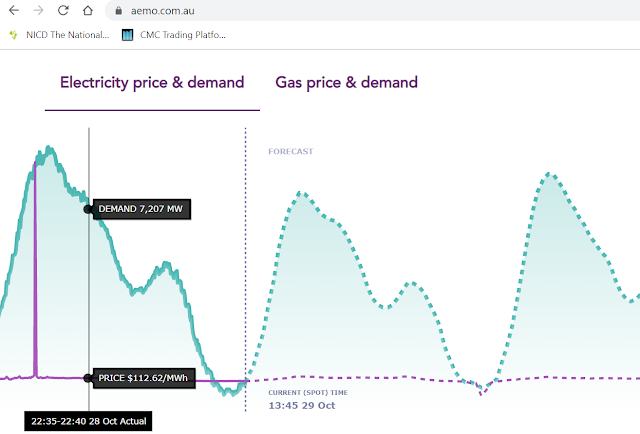Energy isn't power, isn't electricity
Words can hinder understanding just as easily as fostering it.
To be clear, in this blog I'm not talking about the same energy as new-age spiritualists, or the same power as political scientists.
I'm talking about the concepts from the physical sciences. Electricity is a way (not the only way) of moving energy around. Power is the rate at which energy is moved around.
But what is energy, exactly?
The wikipedia page calls it a quantitative property, which is accurate, and super important, but not particularly enlightening (no pun intended). You could just as accurately describe energy as an accounting trick. Not in the sense of any sort of deception, but as in, something that's really clever. Let's have a look at the accounting trick, how it works, and why it's important.
The first thing to recognise is that energy can have lots of different forms, and can change between one form and another. This happens naturally all the time - light energy from the sun is absorbed by things in the environment and converted to heat energy. If those things are the green leaves of a plant, a small amount of the energy in the light (about 4%) is converted to chemical energy stored as sugars. The rest is converted to heat (the plant leaves don't get hot because the heat is conducted away by the air).
Energy conversion between different forms is also done using technology. In a petrol or diesel engine, chemical energy is converted to heat, and then some of the heat is converted to mechanical energy. The rest of the heat comes out of the exhaust pipe, and a radiator for the engine's cooling system. When you switch on a light in your home, electrical energy is converted to light and heat.
Here's the trick, and the significance of the word quantitative in the wikipedia definition. We can measure and calculate the amount of energy in something quite precisely, just as easily as you can measure the weight of an object, or its length. When we do this, and measure energy as it changes from one form to another, we find that the amount of energy is exactly conserved. It can only change from one form to another, but can never be created or destroyed. Nobody "generates" energy - your energy company generates electricity, by converting some of the energy that already exists out there in the natural world. All the energy that we rely on for everyday life has to come from somewhere, and it all has to go somewhere - and the place it goes is generally heat.
Conversion of energy into the form of heat is actually pretty significant for the way that the universe works, and limits what we can do with technology in practice. It turns out that once you convert energy from some other form into heat, you can only convert some fraction of the heat back into another form of energy, generally a pretty small fraction. This is what limits the efficiency of heat engines like petrol or diesel engines. The fact that the conversion into heat isn't fully reversible, means that we effectively can't recycle energy and must continually have fresh supplies that aren't heat. It also means that we can never make a perpetual motion machine - it's not a limit of technology, it's just that the world doesn't work like that.
When we measure the weight of an object, we might use the unit of kilograms. When we measure the length, we might use meters. We could use kilometers, inches, miles, lightyears or cubits, but it doesn't matter: they are all length (or distance) units. Energy is measured in joules (or kilojoules, Calories, kilowatt-hours or electron-volts - all energy units).
Power is the rate of energy transfer, just like speed is the rate of distance change. Speed could be measured in kilometers per hour, or meters per second but fundamentally it's a distance unit per time unit. In exactly the same way, power is an energy unit per time unit. So joule per second would be a power unit - the Watt. One Watt means that one joule of energy us being transferred each second. "Per" actually means divide - distance divided by time tells you speed, energy divided by time tells you power. It follows that speed multiplied by time is distance, power multiplied by time is energy. This is the basis for one of the more confusing ways that energy is quantified - the "kilowatt hour". It's literally kilowatts (a power unit) multiplied by hours (a time unit) - so the result is energy again. Remembering that watts is joules per second, a kilowatt-hour is literally "a thousand joules per second, for an hour".
Thinking about energy as being like water, the amount of energy you have available (say, the usable charge in your phone battery) is a bit like water in a bucket (the battery). As you use your phone, the energy gets converted from chemical energy in the battery, to heat - doing useful things with electricity along the way. This is like pouring the water from one bucket (the battery) into another bucket (the heat). Power is the speed that you pour the water from one bucket to the other. The energy doesn't disappear, it just gets converted to a form that you can no longer do anything useful with. If you increase the power (the pouring rate), the battery bucket will empty faster.
So, power, energy and electricity are related ideas, but they are not the same! Have fun shouting at journalists, who mess this up all time. Use this as a credibility check, to identify people who don't know watt they're talking about :-)

Easy-to-understand explanation, really helps clarify some misconceptions about the fundamentals!
ReplyDelete